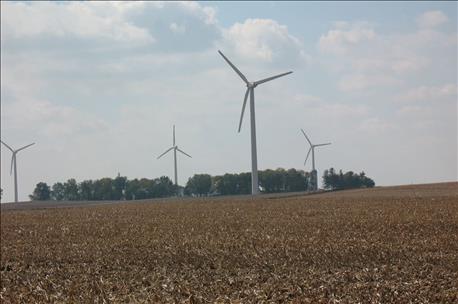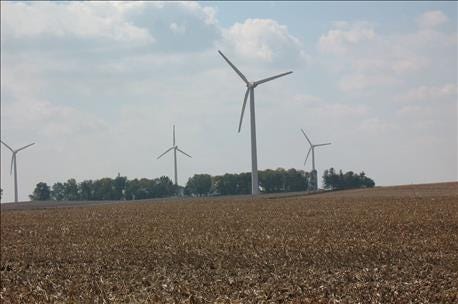
President-elect Donald Trump bashed wind energy when he was on the campaign trail, raising questions about its cost. And he called global warming, which is a driving force to switch to energy generation that creates fewer greenhouse gases, a hoax. Those comments could spell trouble for Iowa, a state that is a wind energy leader. Iowa now gets more than one-third of its electrical power from the spinning blades of wind turbines scattered across the state.

CLEAN ENERGY FUTURE: Iowa has become a national example of clean energy’s economic and environmental benefits, especially in rural areas. Will the incoming Trump administration support ethanol and biodiesel? What about wind energy and solar?
Likewise, people wonder what will happen to the further development and use of other forms of alternative energy, such as solar energy and renewable fuels like ethanol and biodiesel. Will the Trump administration and its fossil-fuel allies support the Renewable Fuel Standard? The RFS, a federal law requiring a certain amount of renewable fuels be blended into the nation’s gasoline and diesel supplies each year, faces fewer hurdles with the new administration than does wind and solar energy, some observers say. Iowa is the leading producer of ethanol and biodiesel.
Ethanol, biodiesel are helping use surplus corn and soybeans
Republican Trump, along with Democrat rival Hillary Clinton, supported the RFS during the campaign. Renewable fuels create good-paying jobs in rural Iowa and provide much-needed demand for corn and soybeans. “The rural vote put Trump over the top and into the White House in the election. I don’t think he’ll forget that,” says Monte Shaw, executive director of the Iowa Renewable Fuels Association. “That doesn’t mean you’ll get 100% of what you want 100% of the time, but I see it as a factor in our favor.”
The renewable fuels industry supports 43,000 jobs in Iowa, says Shaw. And the wind and solar jobs are about 7,600 and growing.
Wind energy is expanding clean energy in Iowa in a big way
Iowa is building more turbines and expanding wind energy farms, thanks to renewed federal tax incentives. In 2016 MidAmerican Energy said it will invest $3.6 billion to add 2,000 megawatts of wind energy, and Alliant Energy will invest nearly $1 billion to add 500 megawatts. The new project pushes MidAmerican’s investment to over $10 billion since 2004 and wind will total about 85% of the utility’s retail sales.
Recently, MidAmerican Energy said it remains committed to its plan to work toward getting all its electricity from renewable energy sources. “The trend has been and will continue toward clean energy,” says Josh Mandelbaum, an attorney for the Environmental Law & Policy Center. Wind energy has benefitted rural Iowa several ways: providing jobs, increased property values and more tax money, and millions of dollars in lease payments to farmers and landowners each year.
Renewable energy is benefitting rural Iowa by creating jobs
Wind energy equipment manufacturers have located in some towns that were economically hard-hit and have boosted local employment. For example, TPI Composites makes blades and Trinity Structural Towers makes sections of steel towers in Newton. And farmers are some of the earliest adopters of solar energy, to cut costs and become more sustainable.
While it’s a smaller segment of the movement to clean energy (compared to wind power and biofuels) solar energy is gaining ground in Iowa. For example, Central Iowa Power Cooperative is building the state’s first utility-owned solar project.
Political support and business support, are strong in Iowa
Both renewable fuel and wind and solar advocates say their industries have powerful political supporters. Gov. Terry Branstad strongly backs renewable energy and biofuels and has “developed a good relationship” with Trump, says Shaw. Iowa’s congressional delegation, including Sen. Chuck Grassley, who is known as the father of the wind energy production tax credits, are strong supporters of renewable energy.
Also important, giant technology companies Google, Facebook and Microsoft have built large data centers in Iowa. They use a lot of electricity and say they’ve invested in Iowa operations, in part, because of low-cost, clean energy supplies. With clean energy and climate goals, these big businesses will continue to drive that market, says Mandelbaum. “That won’t change. In fact, it might become stronger.” It gives Iowa an edge when competing for businesses that use significant amounts of energy.
Demand for more clean energy is continuing to increase
In addition to federal tax credits for wind energy, federal tax credits for solar are available as are state tax credits for solar in Iowa. Despite Trump’s concerns about costs, Nathaniel Baer, energy program director for the Iowa Environmental Council, says the economics of wind energy and solar energy will continue to get better, making these industries less reliant on politics. The cost of producing energy from wind and solar is falling, he says.
Even with the confidence they see building with the demand for clean energy, most energy experts still expect a possible fight over climate change, clean air, water and land protection between environmental interests and the incoming Trump administration.
Agriculture Secretary Tom Vilsack believes RFS will survive
Speaking in Des Moines recently, U.S. Secretary of Agriculture Tom Vilsack, who has served eight years in President Obama’s cabinet, believes the Renewable Fuel Standard will survive a Trump administration. Vilsack says the ethanol and biodiesel industries are too well-established in rural areas to be dismantled.
“There will be noise and saber-rattling, but the RFS supports too many jobs and too much rural infrastructure is already set in place for it,” says Vilsack. “It would be very difficult for the RFS to be repealed.” Ethanol production in the U.S. has more than doubled since 2007, when the current version of the federal RFS law was enacted.
Speaking to the annual meeting of the Iowa Renewable Fuels Association in early 2016, when he was a candidate running for president, Trump said the U.S. should keep the RFS mandates for ethanol and biodiesel in place. But in September his campaign published a fact sheet calling for removal of the biofuel blending credit system. Trump’s campaign later reissued that fact sheet without the language opposing the RFS system.
About the Author(s)
You May Also Like




